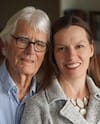
By W. Gifford-Jones, MD and Diana Gifford-Jones —— Bio and Archives May 4, 2024
Comments | Print This | Subscribe | Email Us

New statistics published by the American Cancer Society should be alarming. The numbers point to an increase in colon malignancy in people in their 20s, 30s and 40s. Yet, there’s been a decrease in large bowel cancer among those over the age of 65. In people under 50, the rate has been increasing by about two percent a year since the 1990s.
This data goes against a basic law. Most malignancies occur in older people, and this has been true of colon cancer. This new data sends up a red flag that should not go unnoticed. Moreover, this is not just a North American trend. Large bowel cancer is on the also rise around the world. The question is, why has this occurred.
Colon cancer is now the leading cause of cancer-related deaths for men under the age of 50. And it’s the second leading cause for women under 50 years of age.
Large bowel cancer and rectal cancer are often linked together. And there is evidence that this increase may be related to an increase in rectal cancer. But it does not totally explain the increase.
Do genes play a role in the earlier onset of malignancy? A family history of the problem is a factor for some people. For others, doctors have suspected that cell mutations may be the driving force. The presence of large precancerous polyps in the colon means a greater risk. But questions remain about why there is a rise in large bowel cancer among younger people.
Could it be that changing lifestyles all over the world play a role? Despite talk of healthier diets, people are eating more red meat than ever – up over 10% in the last decade and more of it consumed after processing into convenient foods. People are eating other highly processed foods, downing too much sugar, and binge drinking alcohol. Researchers have shown that some individuals have good bacteria in their intestines, others bad bacteria. There are also questions about nonsteroidal anti-inflammatory drugs. These pain killers may have an adverse effect on the gut.
Clusters of malignancies are seen in some areas. In southern Mississippi, people living near chemical plants are exposed to trace elements such as nickel, arsenic, and chromium. Could these potentially toxic materials be associated with the increase in cancer?
Researchers are also aware of another pandemic, and not a viral disease lasting just three years. It’s the much worse global crisis of obesity, a long-enduring pandemic. The increase in obesity mirrors the increase in malignancies. But not all patients with colon cancer are overweight.
Experts contend there is no single smoking gun responsible for cancer. Multiple risk factors need to be addressed.
What can people do to decrease the risk of dying from colon cancer? People need to assist their doctors with early diagnosis. First, never assume rectal bleeding is due to hemorrhoids.
Second, colonoscopy is the only way to rule out malignancy. This requires laxatives that clean the bowel of fecal material. Then doctors insert a lighted instrument to examine the large bowel. This can be done under full anesthesia or with medication to relieve the minimal discomfort.
Please, do not listen to scaremongers saying colonoscopy is a painful procedure. It’s better labelled a discomfort. Sedation-free procedures are safe, and people can return to normal activities right away.
How many people with rectal bleeding have said, “No one is going to a colonoscopy on me,” and now are dead? Dying from a metastatic colon malignancy is many times more painful than the temporary discomfort of a colonoscopy. Don’t make this terrible mistake.
Sign-up at www.docgiff.com to receive our weekly e-newsletter. For comments, contact-us@docgiff.com. Follow us on Instagram @docgiff and @diana_gifford_jones.
W. Gifford-Jones, MD is the pen name of Dr. Ken Walker, graduate of Harvard Medical School. Diana Gifford-Jones is his daughter, a graduate of Harvard Kennedy School. Their latest book, “No Nonsense Health” is available at: Docgiff.com
Sign-up at DocGiff to receive our weekly e-newsletter. For comments, .(JavaScript must be enabled to view this email address). Follow our new Instagram accounts, @docgiff and @diana_gifford_jones
.